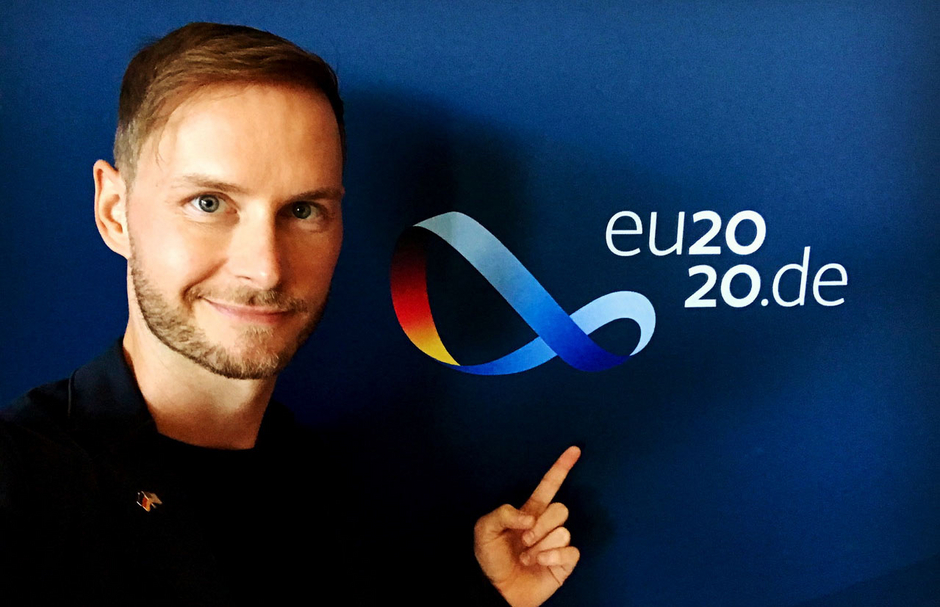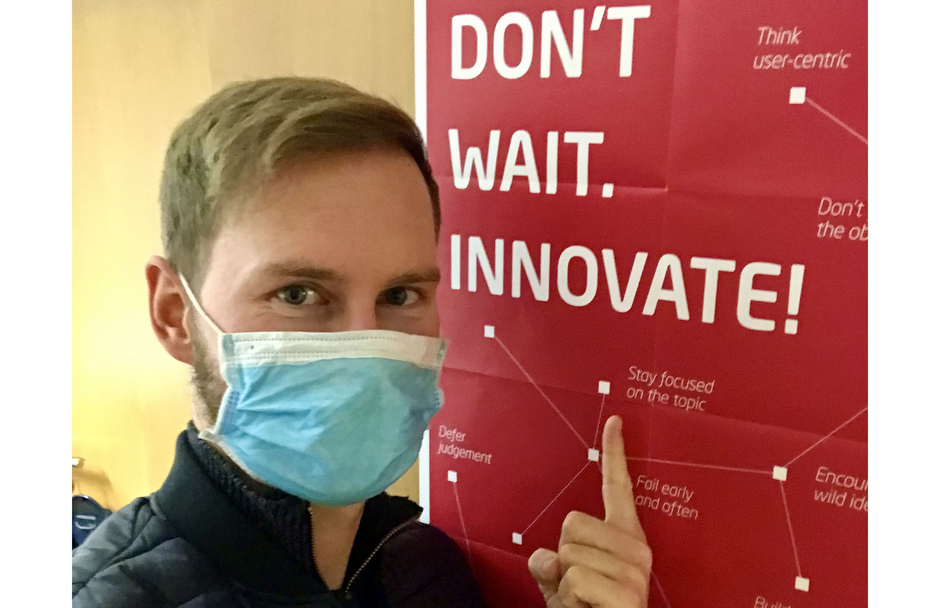From start-ups in the USA to the Federal Ministry of Economics and Energy
After successfully completing his studies, HPI D-School Alumnus Patrick Witt gained several years of professional experience with various Tech Startups in the USA. There he could contribute his design thinking expertise from the Basic and Advanced Track at the Hasso Plattner Institute Potsdam, which he completed in 2013. In his work within the fellowship "Work4Germany" for the Federal Ministry of Economics and Energy he focuses on the modernisation of public administration in the context of digitisation.
For him, teaching creative and digital skills offers the chance to actively work on solutions for societal issues. In the interview he tells us more about his professional career and the role design thinking plays in it.
You studied International Business Management in Berlin, Istanbul and Philadelphia and Design Thinking at the Hasso Plattner Institute in Potsdam. How did your career develop after your studies?
For my internship abroad in Boston and my thesis on "Expansion and Internationalization in Online Retail", I was able to win the German e-commerce company Spreadshirt as a partner. During my studies I was offered a full-time position as a sales professional for the North American market. So it happened that I spent five years helping to build up the B2B business in the USA and the United States became my second home. During this time, the number of employees and sales team turnover grew rapidly and we received several awards for one of the fastest growing startups in the U.S.
My main task was the acquisition and account management of entertainment professionals, social media influencers and YouTube stars, who were able to sell "print-on-demand" merchandise to their fans worldwide via our online store platform.
Since the majority of my clients came from the media and entertainment industry, I spent a lot of time in Los Angeles and built up a good network in California over the years. This helped me to take over the position as Director of Sales for the up-and-coming Berlin advertising start-up Stagelink and thus to establish the first office outside Germany in Santa Monica.
Since 2019 I am now permanently back in Berlin and working as a freelance consultant and most recently as Head of Partnerships at the Augmented Reality Company Zaubar.
You are a Fellow for the Federal Ministry of Economics and Energy within the "Work4Germany" initiative. It is an innovation task force for the German government with the aim of promoting the modernity of the state. In which area are you active in your role as a Fellow?
With the adoption of the Energy Efficiency Strategy at the end of 2019, the German government initiated a multi-year dialogue process called "Roadmap Energy Efficiency 2050" to discuss perspectives for energy efficiency policy in the coming decades and to develop new measures to increase energy efficiency and improve the protection of the environment.
The Working Group on Digitization is one of the six thematic working groups and deals with the energy efficiency of digital infrastructures and technologies and the innovation potential of digitization to increase energy efficiency. I support the working group and the department "Digitization of the Energy Shift" with Design Thinking expertise, digital competence and years of experience with various start-ups to develop user-centered solutions.
Within the fellowship, you will work in innovation tandems of junior executives and government officials from the ministries. What opportunities does this exchange format offer from your perspective?
I am an absolute fan of Work4Germany. In my view, this format offers enormous opportunities for both administrative staff and committed and interested talents from the digital sector.
We work closely together with the administrative staff. We act as sparring partners and support concrete innovation projects to establish an agile mindset, creative methods and digital tools.
As a Fellow, I have the unique opportunity to gain deep insights into the administration as well as into political Berlin, while using my skills for the common good and doing meaningful work.
To what extent do you apply Design Thinking methods in your work at "Work4Germany"?
One of my main projects is the design and piloting of a Design Thinking process to identify measures that will drive new digital business models and solutions to increase energy efficiency.
Furthermore, I conceptualize and moderate workshops - online and offline. For this purpose, I assemble multidisciplinary teams with T-shaped personalities from science, entrepreneurship, C-level executives and representatives of associations who work together on Design Thinking challenges in the fields of building automation and Industry 4.0.
In the last few weeks, these workshops were held exclusively digitally with the help of online whiteboard solutions, as I know them from the Hasso Plattner Institute.
Sustainability and innovation are the focus of your work. What is your vision for your professional career? In which areas do you want to change something with your work?
Due to the rapid increase in digitalization, the huge challenges of climate change and the acceleration of other global megatrends, I am convinced that public administration needs to reinvent itself and programs like Work4Germany should be greatly expanded to teach modern methods, work in an interdisciplinary way and find creative solutions to increasingly complex problems.
I also advocate a reduction in hierarchy, more transparency and better opportunities for cross-changers from the private sector to establish new and user-centered work and more diversity in the administration. I would like to continue supporting this transformation process in order to make politics and society fit for the future.
Contact Patrick Witt on LinkedIn.
Photos: Patrick Witt
The interview was conducted by Anna Dotzek.


